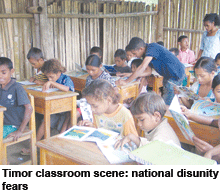A proposal to sanction the use of indigenous languages in primary schools in polyglot Timor-Leste (East Timor) has divided members of government, civil society and educators, raising questions about how language can spur harmony — or discord — in the young nation. The ‘mother-tongue’ programme is spearheaded by the United Nations Education, Scientific and Cultural Organisation (Unesco), which has promoted similar programmes in other countries.
Programme organisers say children best develop cognitive skills when taught in the language spoken at home during their early years of school, rather than in official national languages — Tetum and Portuguese in the case of Timor-Leste — which are less commonly used in community settings. About one in five children in Timor-Leste must repeat the first year of schooling, and half of the students who enroll in primary school do not complete it, according to the most recent UN Human Development Report. “Portuguese resonates historically, socially and culturally for Timorese like no other language, but the reality is that in many homes across Timor-Leste, neither (Tetum or Portuguese) is the first language of communities, so their use inhibits (children’s) ability to acquire new knowledge,” Kirsty Sword-Gusmão, an Australian-born social activist who is head of the country’s Unesco office, told IRIN.
 Poor education and the limitations it imposes on job opportunities for young people are among the leading potential causes of future friction, she adds. Youth gang violence has until recently been problematic in cities, but is now declining. Portugal controlled Timor-Leste as a colony until 1975. Less than two weeks into Timor-Leste’s independence, Indonesia invaded and began a brutal 24-year occupation. A quarter of the island nation’s population perished under Indonesian rule.
Poor education and the limitations it imposes on job opportunities for young people are among the leading potential causes of future friction, she adds. Youth gang violence has until recently been problematic in cities, but is now declining. Portugal controlled Timor-Leste as a colony until 1975. Less than two weeks into Timor-Leste’s independence, Indonesia invaded and began a brutal 24-year occupation. A quarter of the island nation’s population perished under Indonesian rule.
Many of Timor-Leste’s independence leaders were educated in Portuguese and have promoted it as the language of resistance to emphasise historical and cultural differences between their would-be nation and surrounding island territories controlled by Indonesia. They also deemed Portuguese to be a neutral language among the people of Timor-Leste, which has dozens of indigenous languages. When Timor-Leste achieved independence, its leaders chose Portuguese and Tetum as the country’s official languages and media of instruction in schools.
Though most adults in Timor-Leste speak Tetum, many have a tenuous grasp of the language during their early years of schooling. The mother-tongue programme will facilitate instruction to students in the language spoken at home during their initial years at school, after which Tetum and Portuguese will be gradually included. A pilot programme is scheduled to be introduced in 12 primary schools across the country.
Opponents say the project will be difficult to implement because most of the country’s indigenous languages have little or no script and limited vocabularies. More importantly, they argue, mother-tongue instruction could jeopardise national unity in a country with less than a decade of self-rule and a history of bloody flare-ups derived from regional factionalism.
“This policy would inculcate a sense of division… it would slowly start to destroy national identity and unity,” said a statement reflecting the strong opposition to the plan in some parts of the country. It was released by a coalition of local NGOs, some of which later withdrew their support. “We are struggling to consolidate unity so that everybody thinks as an East Timorese instead of thinking, I’m a Mumbai, I’m a Fataluco, etc,” President José Ramos-Horta told IRIN, referring to two of the country’s ethnic groups. In 2008, Ramos-Horta barely survived an assassination attempt that stemmed, in part, from regional factionalism.
(Excerpted and adapted from www.irinnews.org)
Also read: International Mother Language Day (IMLD)























